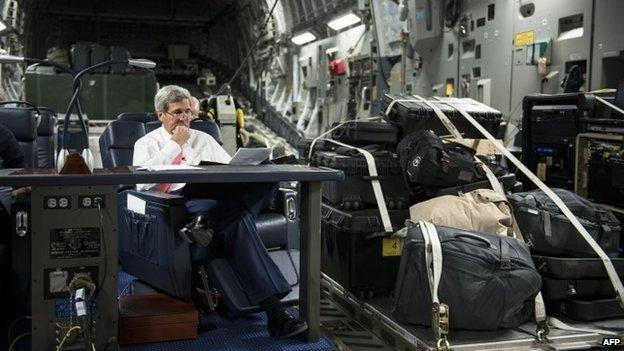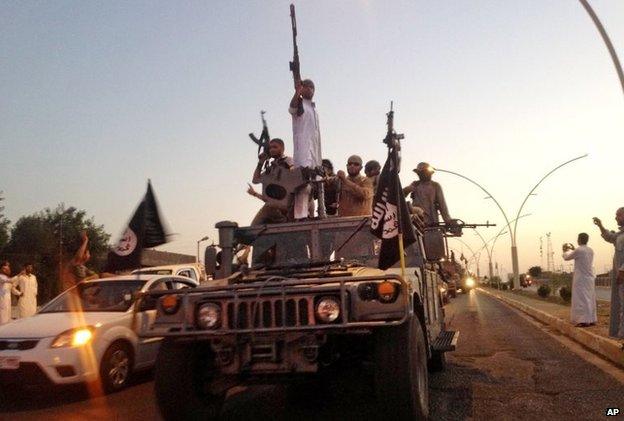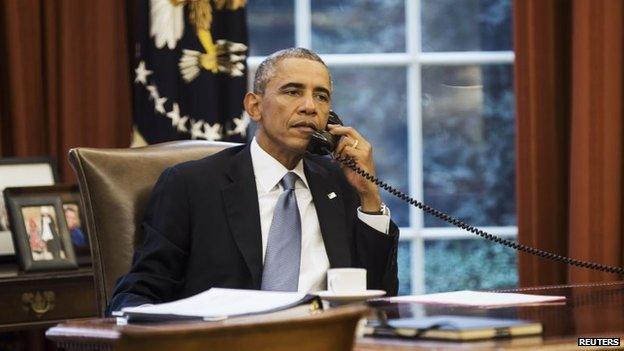Barack Obama to lay out plan to defeat Islamic State
- Published
Jon Sopel reports: ''This will be a moment of political drama''
US President Barack Obama is due to lay out a strategy to "destroy" Islamic State militants "wherever they exist".
He is reportedly set to approve the first US air strikes in Syria and increase US military aid for non-IS Syrian rebels in a televised speech.
Secretary of State John Kerry is in the Middle East trying to build a coalition against IS. Mr Obama's allies are canvassing support in Congress.
IS controls large parts of Syria and Iraq after a rapid military advance.
The jihadist group now runs a de facto government from the Syrian city of Raqqa, employing officials and administrators.
Its fighters have become notorious for their brutality, beheading enemy soldiers and Western journalists on video.
BBC correspondents across the Middle East consider the threat posed by IS

Where regional powers stand
Iran: Calls for co-operation against IS, turns a blind eye to US military action
Syria: Assad government opposed to IS, but US prefers to support moderate rebel groups fighting them
Turkey: Opposes IS, but opposition muted by concern for 49 Turkish diplomats and their families kidnapped by IS in Mosul in June
Saudi Arabia: Key supporter of Syrian rebels, including Islamists, but denies direct support for IS


John Kerry is on a tour of the Middle East - Jordan is the next stop after Iraq

IS has released propaganda videos showing fighters parading vehicles stolen from army bases
The US military has carried out scores of air strikes in Iraq, where it can claim the support of the government.
Mr Obama has already authorised $25m (£15m) in aid for the Iraqi military.
But any announcement about Syria is likely to be far more controversial.

Analysis: Barbara Plett-Usher, BBC News, Baghdad
An inclusive Iraqi government was the condition the Americans set for increased US and Nato military support. But a senior state department official said Mr Kerry was mostly talking to leaders about Baghdad's role in the global coalition against Islamic State.
The US wants to see speedy moves by the Shia majority to meet the grievances of the disgruntled Sunnis and Kurds, so all can form a united front against IS.
That is an enormous challenge, given that many disputed issues have deep structural roots. But the US official said a significant step would be the creation of regional armed forces or national guard units, a decision taken in the wake of criticism that the army had been used as a sectarian tool by the former Shia prime minister.

'Degrade and destroy'
In an excerpt released ahead of the speech, Mr Obama said that his objective is to "degrade, and ultimately destroy, ISIL [Islamic State in Iraq and the Levant - the previous name for IS] through a comprehensive and sustained counter-terrorism strategy".
He will add that the campaign will be different from interventions in Iraq and Afghanistan and that there would be no American troops on the ground.
"This counter-terrorism campaign will be waged through a steady, relentless effort to take out ISIL wherever they exist using our air power and our support for partner forces on the ground", he will say.
The US president has backed rebels fighting the Syrian government for the past three and a half years.
His plan to fund and train those same rebels to fight against IS would be likely to anger Syria.
It is not clear how the US could legally launch air strikes in Syria without the permission of the Assad government.
Last year, Mr Obama came to the brink of launching air strikes against Syrian government forces over their use of chemical weapons.
He shelved that plan after he failed to build a sufficient coalition, and Syria agreed to destroy its stockpiles.
Opinion polls now show a majority of Americans in favour of some kind of action against IS.
But Mr Obama still faces a huge challenge to get approval for his plans.

Barack Obama spoke to Saudi Arabia's King Abdullah as part of his push to build a coalition
Mr Kerry was in Iraq earlier on Wednesday, where he praised the new government's plans to devolve more powers to the Sunni Muslim minority and build better ties with the Kurds.
Many Sunnis who felt sidelined by the previous Shia-led administration backed Islamic State.
Mr Kerry said the new Iraqi government had to be the "engine" for the global fight against IS.
French Foreign Minister Laurent Fabius earlier said his government would contribute to air strikes against IS.
Mr Obama also spoke to Saudi Arabia's King Abdullah earlier in the day,
Analysts say the kingdom, which has backed Sunni groups around the Middle East, is crucial to any effort to build a coalition against IS.